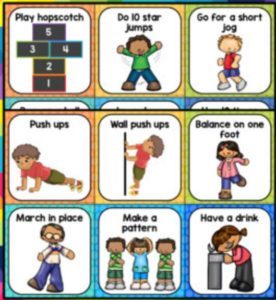Sensory Creatures with Sensory Diet needs
As parents we are conscious of our child’s sensory system likes and dislikes and often cater to them without even realizing. We rock them as a baby which is meeting their “vestibular need” or hug them when they are tired which provides input to their “proprioceptive” system that helps them to calm. What we are not often as aware of is that these sensory system needs are part of their “daily sensory diets”. Being a parent requires you to read their needs and adjust accordingly before they even have the words to tell us what they want or need. As they fidget and become fussy a quick 10 minutes of outside heavy work and some fresh air with built in deep breathing seem to work magic on their moods and ability to cope with life and the struggles it hands us all. It is actually not magic, but the magic of sensory regulation strategies.
Sensory Break examples:

Every child, and every adult, has sensory needs throughout every day of their life and these needs fluctuate and change over time. This is a skilled intervention that occupational therapy can provide and help to find the just right challenge and just right sensory diet in order to increase positive mood, task focus, and independence for your children. On days that your child seems to be jumping around on the furniture more, running and “crashing” into the couch or bed they are most in need of proprioceptive input. On days that your child is having a harder time coping with even the littlest inconveniences or changes in schedule these proprioceptive tasks can also be helpful in calming our bodies such as hugs, jumping jacks, or jumping on a trampoline. If your child seems fearful of height, such as climbing to the top of an outdoor play structure, or is unwilling to swing or use a trampoline they are likely in need of skilled intervention in order to address this vestibular tolerance deficit. As parents we adjust to what our children need, though when realizing there are needs that are becoming harder to fulfil or is impacting your child’s ability to play with other peers, skilled occupational therapy may be the next step in the best thing you can do to help your child succeed!
Celeste Roberts, MS OTR/L

 Skip to content
Skip to content